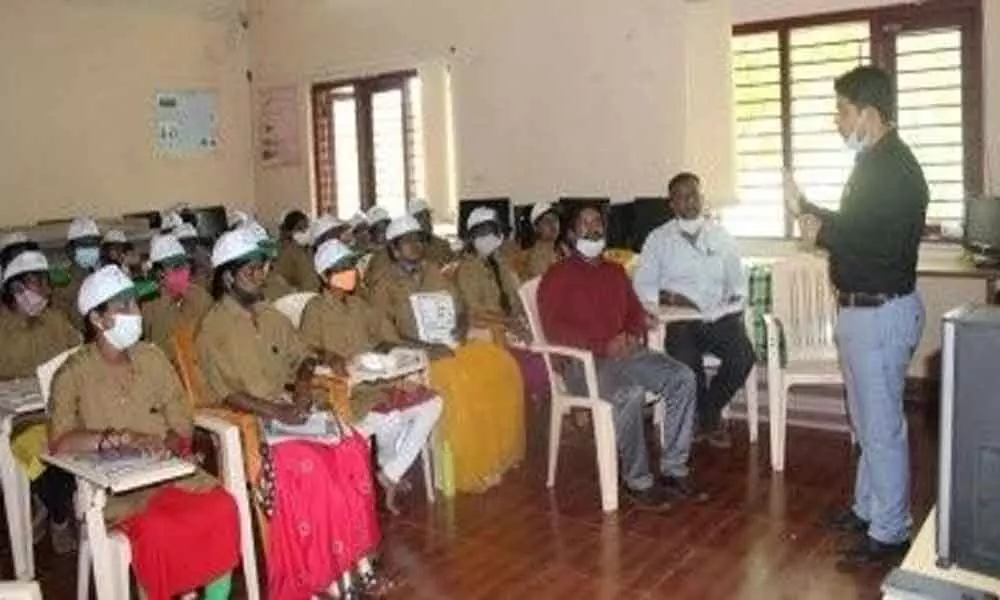In rural Haveri, women learn to drive Swaccha Vahini vehicles, manage solid waste

"I am an M.A. degree holder, and I was working as a guest lecturer when the COVID-19 pandemic hit us so unexpectedly.
Haveri: "I am an M.A. degree holder, and I was working as a guest lecturer when the COVID-19 pandemic hit us so unexpectedly. I never imagined becoming a driver for the Swaccha Vahini auto tippers that collect dry solid waste. But I am ready to drive an auto tipper to collect waste in our village along with nine other women in our group," shared Gopini Giddammanavar.
Chalagere, where she lives, had recently signed an MoU with the Sanjeevini Self Help Group (SHG) to oversee the entire dry waste management in the gram panchayat.
Wheels of independence
The Sanjeevini SHG, formed under the National Rural Livelihood Mission (NRLM) and registered under the State Cooperative Act, comprises 10 to 20 women members on average who receive livelihood training and financial assistance through the NRLM and Karnataka State Rural Livelihood Promotion Society (KSRLPS). Haveri district has 6,183 Sanjeevini SHGs and Karnataka has 1,81,931 in total. Gopini admitted that driving an auto-tipper is difficult in rural areas, but she wanted to try something new, and this was an apt opportunity. "I will never hesitate to drive Swaccha Vahini and collect dry waste even though I am a graduate; I am proud of this work," she beamed.
This is not just Gopini's story, but that of all 32 women who have received training at the Bank of Baroda Rural Self-employment Training Institute (RSETI) at Haveri to run the Swaccha Vahini at different gram panchayats. Among them, three women are graduates, working part-time jobs as teaching faculty. The rest have completed their SSLC. The group has completed their one-month training and are ready to be part of Haveri Zilla Panchayat's pilot programme to employ women drivers. "The first batch of one-month driving training along with food and accommodation for the women has been successfully completed. Apart from driving, we have also trained them in life skills and banking services. They will be well-equipped to be self-sufficient after this training," claimed Shajit S, Director of RSETI.
One of the trainers told 101Reporters, "Along with driving lessons, we have also explained to them about the main parts of the vehicles and taught them minor mechanical repair skills. They have participated enthusiastically, and each woman trainee has driven a vehicle for 6 km every day. They can run auto tippers without any hassle in rural areas."
The Zilla Panchayat is planning to start a second batch for training women drivers through RSETI. Earlier, women would only collect and segregate dry waste like paper, cardboard, glass, plastic, cloth, and metal, and it was male drivers who would operate auto tippers. The dependency on male drivers will drastically reduce after more women drivers complete their training. As many as 109 gram panchayats (out of 223 in Haveri) received auto tippers worth Rs 6 crores under the Swacch Bharath Mission, and the newly trained women drivers will operate these vehicles.
When contacted, Mohammad Roshan, the Chief Executive Officer of the Haveri Zilla Panchayat, explained that women aged 18 to 45 had completed their driver training and would get a light motor vehicle driving license after the prescribed period. "These 32 women drivers will operate Swaccha Vahini auto tippers at their respective villages to collect dry waste door-to-door and dispose them at solid waste management units," he told 101Reporters. The CEO also said they had planned to set up solid waste management units in 170 gram panchayats. "We will employ the services of local women members of the SHGs to manage the units. They will manage everything -- from collecting dry garbage from each household, producing manure from the waste, selling it, and driving auto tippers. The initiative will help women become financially independent," emphasised Roshan.
Currently, most gram panchayats are implementing waste management at open spaces and are not following scientific methods of segregation and recycling garbage, affecting people's health in surrounding places and causing severe distress to the environment. Moreover, waste management staff have no protocol in place to manage the process. Cattle and other animals end up ingesting harmful waste, affecting their health as well.
Tumminakatti gram panchayat in Ranebennur taluk has recently started using waste management units and is receiving a good response from the public. They have been collecting dry waste from households and segregating it for recycling. They have also built an eco-friendly park in the village out of recycled materials. The gram panchayat provides the vehicles and waste management units, and the Sanjeevini team does not have to make any investment. The team will eventually pay salaries using the earnings from selling recycled waste.
Breaking stereotypes and
challenging the status quo
Satish Ilager, a member from the Agadi gram panchayat, believed that women could only drive light motor vehicles, and running auto tippers for dry waste collection in rural areas would prove challenging. Many drivers in these areas do not follow driving rules. Also, most rural roads are pathetic, especially the interior pathways, which are very narrow. Another critical concern for sanitation workers is that they are looked down upon due to their choice of occupation. However, villagers are curious about them and want to witness how they manage the solid waste management unit, including driving a vehicle themselves. Initially, even family members hesitated to allow their women to attend driving classes and work in waste disposal, but the Zilla and the gram panchayat officials convinced them. Women drivers will start work soon. Meanwhile, the Zilla panchayat has planned a one to two-day training at every gram panchayat level to boost the women's morale and confidence.
"We are confident that they could manage the entire solid waste management unit in our gram panchayat, including driving Swaccha Vahini themselves. They display great commitment, and this will reduce the dependency on male drivers, and solid waste management will be a smooth process," said Venkatesh Ukkadagatri, Panchayat Development Officer (PDO) of Chalagere gram panchayat in Ranebennur taluk.
Female drivers concur with the PDO, are confident of their driving skills, and reiterate that they could handle large vehicles just like their male counterparts. "We are not worried about driving auto tippers for dry waste disposal in the villages because we do not drive speedily and avoid rash driving. Moreover, we only need to drive a maximum of 6-8 km per day, so it is very easy for us. The only thing is that people in rural areas judge us as inferior to them based on our job.
However, we try not to let it affect us. We believe that work is worship and many government officers have great respect for us. We know this is a noble profession because we are contributing to our environment," asserted Nirmala Harijan, an auto tipper driver from Chillurbadni of Savanur taluk.








